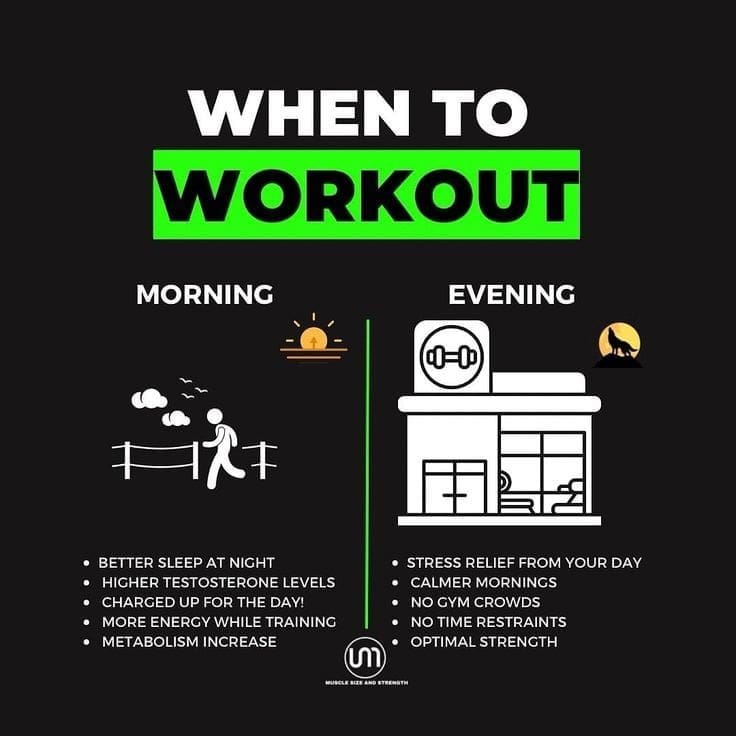What’s the Best Time to Exercise? Morning vs. Evening Workouts
Have you ever wondered when the best time to exercise really is? With so much advice online, it can feel overwhelming. Some swear by morning workouts, others thrive in the evening. The truth is, there’s no single answer. It all comes down to your personal schedule, energy levels, and fitness goals. In this article, we’ll break down the pros and cons of exercising at different times of the day to help you find your perfect fit.
Why Does Timing Matter for Exercise?
Exercise is beneficial no matter when you do it, but the timing can influence performance, consistency, and how your body responds. Your body temperature, hormone levels, mental focus, and even digestion fluctuate throughout the day. Understanding these patterns can help you make smarter fitness decisions.
The best time to exercise is often the time you’re most likely to stick with. But depending on your goal — whether it’s weight loss, muscle gain, or stress relief — you might benefit more from one time of day over another.
Morning Workouts: Why They Work for So Many
Morning exercise is a favorite for those with busy schedules or people who feel energized after a good night’s rest. Working out early can create a healthy habit loop — starting your day on a positive, focused note.
Benefits of morning workouts:
- Boosts your metabolism early in the day, helping with calorie burn
- Enhances mental clarity and focus thanks to increased endorphins
- Fewer distractions and schedule conflicts first thing in the morning
- May improve discipline and consistency over time
On the flip side, early morning workouts may feel harder for those with lower energy levels in the morning or those needing longer warmups. Your flexibility and coordination may be lower in the morning, so it’s especially important to start with dynamic stretching and light movement before more intense activity.
Evening Workouts: Are They More Effective?
If mornings aren’t your thing, don’t worry. Late afternoon or evening might actually be the best time to exercise for your body. This is when your body temperature peaks, which means your muscles are warmer, your joints are more mobile, and your strength may be slightly higher.
Benefits of evening workouts:
- Higher performance potential due to warmed-up muscles and elevated hormones
- Ideal for strength training or high-intensity routines
- Can help release stress and tension built up throughout the day
- May support better sleep for some (if not too close to bedtime)
However, late-day exercise can be tough to fit in if your evenings are packed. Social events, fatigue, or dinner plans may derail your workout if it’s not locked into your routine. Also, intense workouts too late (like after 8–9 PM) might interfere with sleep for some people.
How to Find Your Personal Best Time to Exercise
Ultimately, the best workout time is one that suits your life. If you’re not a morning person, don’t force it — but if evenings are too hectic, try a midday session. Track how your body feels, your energy before and after, and how consistent you are.
Here are some tips to help identify your ideal exercise window:
- Try both morning and evening workouts for 1 week each
- Journal your mood, energy, and workout results after each session
- Notice when you feel more motivated or physically capable
- Listen to your body — it’s your best coach
Pairing Timing with Fitness Goals
Still not sure? Consider these general guidelines based on goals:
- Fat loss: Some studies suggest fasted morning cardio may support fat burning
- Muscle gain: Late afternoon may be optimal due to testosterone and strength peaks
- Stress relief: Evening yoga or light cardio can help unwind from the day
- Consistency: Morning may work better if you tend to skip evening workouts
Related Practices to Support Your Routine
Finding the best time to exercise is just one piece of the wellness puzzle. Enhance your results by integrating complementary habits:
- Yoga sessions for recovery and flexibility
- Proper hydration before and after workouts
- Mindfulness techniques to stay focused
- Balanced meals timed around your workouts
Watch: Best Time to Exercise Explained
Still unsure? This quick video breaks down the science and psychology behind workout timing to help you decide:
FAQ: Your Questions Answered
Q: Is it better to exercise on an empty stomach?
A: Morning fasted workouts may help burn fat, but it depends on your body. If you feel lightheaded or sluggish, a small pre-workout snack is better.
Q: Will evening workouts affect my sleep?
A: Intense workouts late at night can interfere with sleep for some. Try to finish workouts at least 2 hours before bed to allow the body to wind down.
Q: What if I can only exercise at odd hours?
A: That’s fine! The most important thing is consistency. If 2 PM or 9 PM works best for you — do it! The body adapts with routine.
Final Thoughts
There’s no one-size-fits-all answer to the best time to exercise. What matters most is finding a time that fits your energy, your schedule, and your long-term goals. Whether you’re stretching at sunrise or lifting weights after dinner, consistency is key. Choose a time you enjoy, and your fitness habit will stick for life.
Disclaimer
The content is purely informative and educational in nature and should not be construed as medical advice. Please use the content only in consultation with an appropriate certified medical or healthcare professional
Related: Discover the Health Benefits of Yoga


